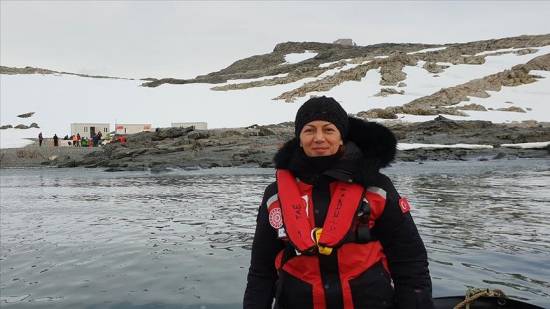A scientist specializing in Arctic studies said research on Antarctica has shed light on global climate change as well as the Earth’s history.
Burcu Ozsoy, a member of Istanbul Technical University’s Faculty of Maritime Studies and chairperson of the TUBITAK Marmara Research Center’s Institute of Arctic Research, has been conducting studies on sea ice on the white continent.
Having been to Antarctica six times and taken charge in the four scientific expeditions Turkey has organized on the continent, she was awarded by the Turkish Academy of Sciences for her arctic studies.
With regard to the International Day of Women and Girls in Science, Ozsoy told Anadolu Agency about her studies on the pole.
Working on oil pollution in seas in her master’s studies, Ozsoy started working on remote sensing for her doctorate degree at Texas University in the US and examined Antarctica through NASA’s satellites.
After informing the launcher of a satellite about a problem with its functioning, she was invited to NASA and went to the US base in Antarctica in 2006.
“I returned to Turkey in 2010. I gained a serious amount of knowledge and wanted to initiate an enterprise in my home country,” she said.
Ozsoy said when she went to Antarctica and saw the bases of countries, she wished for Turkey to have a base on the white continent.
With this purpose in mind, she founded the Istanbul Technical University Polar Research Center (ITU PolReC) in 2015.
Later, ITU PolReC carried out three national expeditions in Antarctica with the Industry and Technology Ministry. Evolving into the TUBITAK MAM Institute of Arctic Research, they conducted the fourth national expedition on the continent.
“As Antarctica is a continent dedicated to peace and science, as Turkey, we made it possible for scientists from other countries to join our expeditions,” Ozsoy said.
They have enabled more than 70 researchers, scientists, teachers and experts to conduct scientific research studies on the white continent. Ozsoy noted that a total of 48 scientific articles were published after the studies.
She said the main purpose of the project is for Turkey to acquire a consulting status and establish a Turkish scientific base on the continent.
- Antarctica represents Earth’s history
Underlining that the poles are the regions where climate change can be monitored, Ozsoy said more elements that trigger the climate are present on the poles, which makes the studies on these regions important.
She said information related to millions of years ago is hidden in the 4,000-meter-thick ice in Antarctica.
“You take a sample from 3,000 (over 9,800 feet) meters below, and it takes you 800,000 years back in time. The memory of the Earth’s past is hidden in it; formations, geological and atmospheric structures.”
“The biggest hole in the ozone layer is in Antarctica. On land with an area of 14 million square kilometers, only 1,000 scientists live. The polar regions are precious in climatic, economic and scientific terms,” she added.
- 'Stop telling yourself you can't do it'
Ozsoy also noted that the number of women in the field of science is fewer than men.
“This is why we should be motivated more. I call on our young girls to stop telling themselves ‘I can’t do it, I can’t be a scientist,’ but rather do research, improve themselves, ask questions and contact scientists,” she said.
“We need to shed light on the world. I want our youth to be motivated and our young girls to question and contact us, the scientists. If they have role models, I have no doubt that they will be in better positions than we are.”/aa


